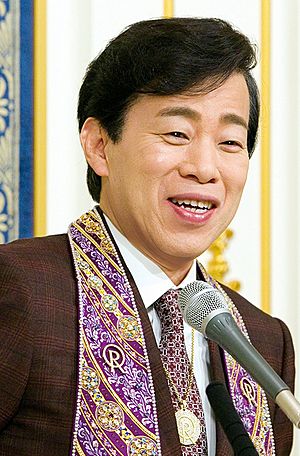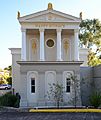Happy Science facts for kids
幸福の科学

The official logo for Happy Science.
|
|
| Formation | 6 October 1986 |
|---|---|
| Founders | Ryuho Okawa |
| Type | Modern spiritual group from Japan |
| Headquarters | 1-2-38 Higashi Gotanda, Shinagawa-ku, Tokyo 141-0022, Japan |
|
Membership
|
|
| Ryuho Okawa | |
|
Formerly called
|
The Institute for Research in Human Happiness (until 2008) |
Happy Science (in Japanese, Kōfuku-no-Kagaku) is a modern spiritual and religious group that started in Japan. It was founded on October 6, 1986, by a man named Ryuho Okawa. Before starting Happy Science, he worked on Wall Street, a famous financial district in New York City.
Followers of Happy Science believe that Ryuho Okawa is the earthly form of a powerful god from the planet Venus. The group's main goal is to teach people how to find happiness. Some people have called Happy Science a cult.
Happy Science is more than just a religious group. It has its own publishing company called IRH Press, schools called Happy Science Academy, and even a university. It also has a political party in Japan called the Happiness Realization Party and runs three entertainment companies that make movies and other media.
Contents
History of Happy Science
Ryuho Okawa decided to leave his job at a trading company to start his own organization. He created Happy Science on October 6, 1986. The Japanese government officially recognized it as a religious group on March 7, 1991.
According to Okawa, the purpose of Happy Science is "to bring happiness to humanity by spreading truth." Before he founded the group, Okawa wrote many books. These books contained what he called "spiritual messages" from famous historical and religious figures like Jesus Christ and Confucius.
In 1987, he published three important books: The Laws of the Sun, The Golden Laws, and The Laws of Eternity. These books became the main texts for Happy Science, along with a key prayer book called The Dharma of the Right Mind.
What Happy Science Teaches
The teachings of Happy Science focus on finding true happiness and improving oneself. The group has several core ideas that its members follow.
The Path to Happiness
The basic teachings of Happy Science are called "Exploration of the Right Mind" and "The Fourfold Path." To be happy, members practice four key principles:
- Love: This means giving love to others freely.
- Wisdom: This is about learning and understanding the world.
- Self-reflection: This involves looking at your own thoughts and actions to improve yourself.
- Progress: This means always trying to grow and become a better person.
Anyone can join Happy Science if they want to seek truth and help create a world filled with love, peace, and happiness. Members can take special training courses to learn more and advance within the group's community.
Belief in El Cantare
Happy Science members worship a god named El Cantare. They believe El Cantare is the "Highest God of Earth" and the ruler of all other gods.
According to their beliefs, El Cantare first came to Earth 330 million years ago. They also believe this same god has been known by other names throughout history, such as Hermes, Odin, and the Buddha. Followers see Ryuho Okawa as the current form, or incarnation, of El Cantare on Earth.
Other Spiritual Beliefs
Besides El Cantare, Happy Science teaches about many other spiritual ideas. Members believe in:
- Reincarnation: The idea that a person's soul is reborn into a new body after death.
- Angels and demons.
- Heaven and hell.
- Aliens from other planets.
Happy Science in Society
Happy Science is active in many areas of society, including politics and entertainment.
Political Party
The group's political party, the Happiness Realization Party, has its own ideas for Japan. It supports increasing the country's military strength and having nuclear weapons for defense. The party also has its own views on historical events, which are different from what most historians teach.
The party also focuses on improving Japan's economy by building new roads and dams, and preparing for natural disasters. It supports lower taxes and a strong relationship between Japan and the United States. As of 2018, the party had 21 members elected to local councils in Japan.
Places of Worship and Schools
Happy Science has headquarters, places of worship, and missionary centers in Japan and many other countries. Their worship centers are called Shoja or Shoshinkan.
The first branch outside of Japan opened in New York City in 1994. Today, Happy Science has locations in countries like South Korea, Brazil, Uganda, the United Kingdom, Australia, India, and Singapore.
In addition to its worship centers, the group runs two private boarding schools in Japan.
See also
 In Spanish: Happy Science para niños
In Spanish: Happy Science para niños
 | Ernest Everett Just |
 | Mary Jackson |
 | Emmett Chappelle |
 | Marie Maynard Daly |








